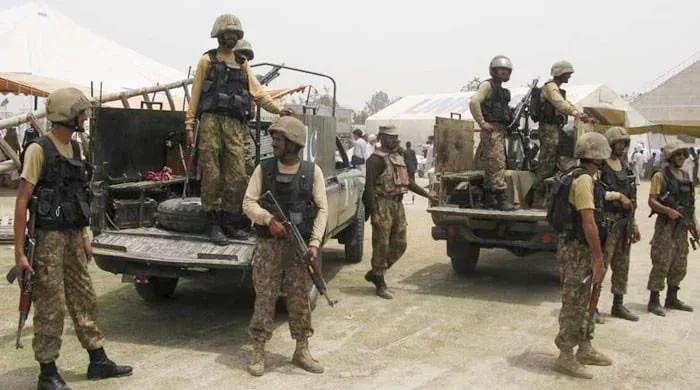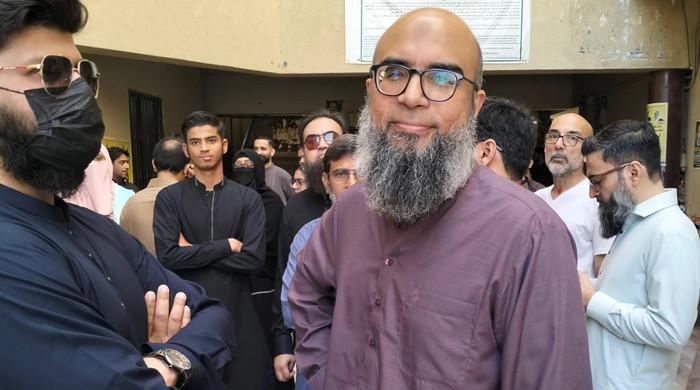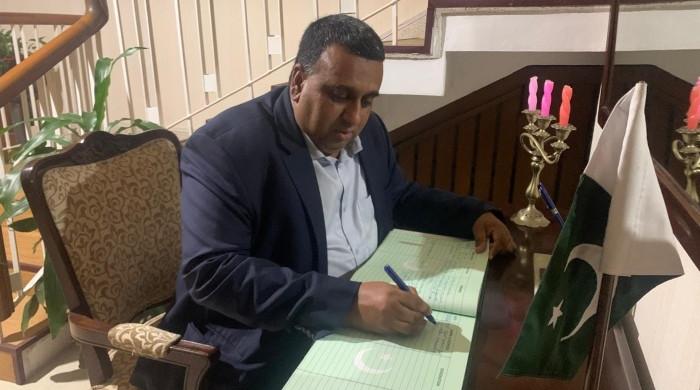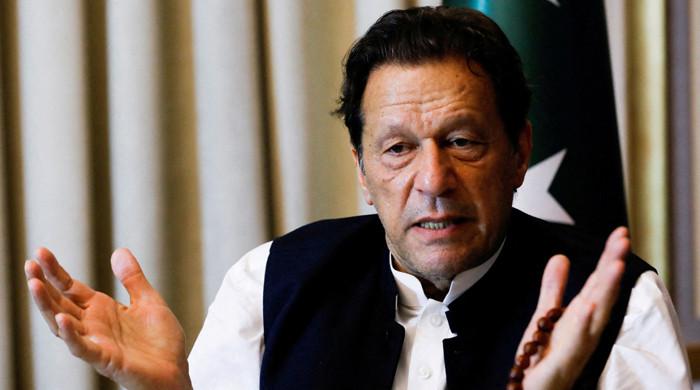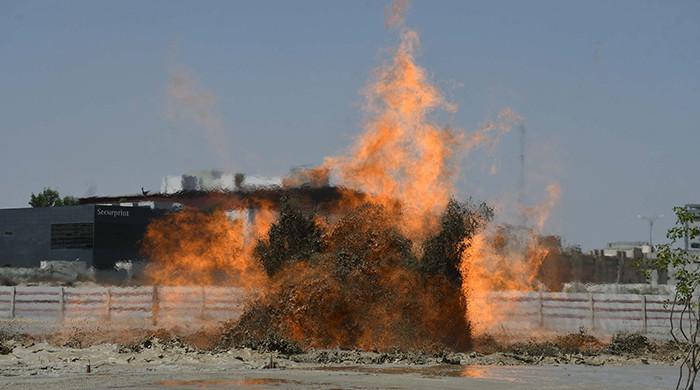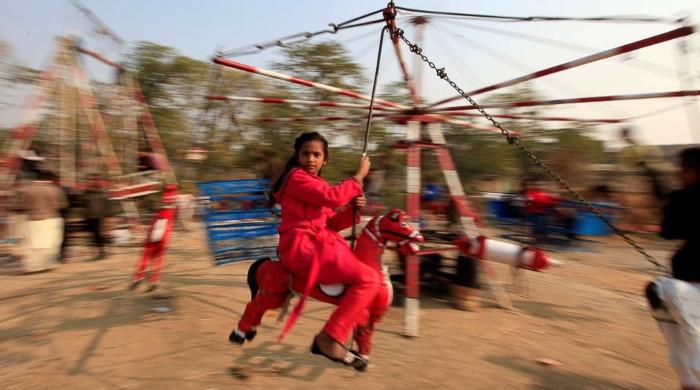PM Abbasi, Saudi King discuss bilateral ties, regional, international issues
Governor Riyadh Faisal bin Bandar Al Saud received the premier and army chief at Riyadh airport
November 28, 2017
RIYADH: Prime Minister Shahid Khaqan Abbasi and King Salman bin Abdulaziz Al Saud of Saudi Arabia discussed bilateral relations as well as the regional and international issues of mutual interest in a meeting here on Monday during the former’s one-day visit to the Kingdom.
During his meeting with the King, the two dignitaries reviewed the entire spectrum of their bilateral relations in addition to regional and international issues.
They also discussed ways and means to further enhance their bilateral relations in diverse fields.
Abbasi was accompanied by Minister of Foreign Affairs Khawaja Muhammad Asif, Chief of Army Staff General Qamar Javed Bajwa, and Director-General of the Inter-Services Intelligence (ISI) Lt Gen Naveed Mukhtar.
During the visit, the premier held meetings with the Custodian of the Two Holy Mosques King Salman and the Crown Prince His Royal Highness Prince Mohammed bin Salman Al Saud.
The Saudi King also hosted a luncheon in honour of Abbasi and his delegation.
The Prime Minister lauded the efforts of the Saudi leadership in bringing peace and stability in the region and assured the Saudi King of Pakistan’s full support in this regard.
The Saudi King praised the excellent relations that exist between the two sides and efforts of Pakistan in rooting out the menace of terrorism and extremism from its soil.
Vision 2030, IMCTC
During his meeting with the Crown Prince, the Prime Minister praised his vision for launching the national economic transformation plan ‘Vision 2030’ and offered Pakistan’s technical and human resource assistance in achieving it.
Abbasi also appreciated the efforts and dedication of the Crown Prince in launching a unified platform of Muslim countries — in the form of Islamic Military Alliance to Combat Terrorism (IMCTC) — for countering the menaces of extremism and terrorism that were distorting the real essence of Islam.
The Crown Prince — while appreciating the efforts of Pakistan in fighting terrorism and its active participation in IMCTC — said Saudi Arabia and other countries of the coalition looked forward to learning from Pakistan’s experience in this field.
He underscored the fact that there was a great potential for further strengthening of our bilateral relations, especially in the fields of economy, trade, investment, and defence.
Abbasi's second visit
Earlier upon arrival in Saudi Arabia, the Prime Minister was received at King Salman Airbase by Prince Faisal Bin Bandar Al Saud — the Governor of Riyadh province.
This was Abbasi's second visit to Saudi Arabia. Prior to this, he had visited the Kingdom soon after assuming office.
Pakistan and Saudi Arabia enjoy close and fraternal relations.
The traditionally warm bilateral relations are based on mutual trust and common aspirations of the people of the two countries.
In 1951, the two countries had signed a ‘Treaty of Friendship’, which lays the foundation of our bilateral relations.
Abbasi later left for Pakistan at the conclusion of his visit.
'Wipe terrorists from earth'
Earlier, the prime minister and General Bajwa attended the IMCTC conference, where the Alliance's military commander General (retd) Raheel Shareef addressed the attendees
Speaking to the defence ministers at the IMCTC, General (retd) Shareef emphasised on the multilateral counter-terrorism efforts. He said while all individual states were making efforts against the menace of terrorism, the required level of synergy and resources were lacking, said a press release issued here.
The former Army chief noted that the IMCTC would support its partners mainly through intelligence sharing and capacity building, underlining how the Muslim world was the biggest sufferer of the menace of terrorism.
"Fight against the faceless enemy with extremist ideology is complex and challenging, requiring collaboration. Pakistan has turned the tide and has had defeated the menace," he stated further, as officials from 40 Muslim countries gathered Sunday in the first meeting of an Islamic counter-terrorism alliance.
During last six years alone, General (retd) Shareef said, more than 70 percent of all deaths attributed to terrorism had occurred in Muslim countries.
Saudi Arabia, in response, vowed that the new Islamic alliance "will wipe terrorists from [the] earth".
Crown Prince Mohammed bin Salman — who is also the Saudi defence minister — vowed to "pursue terrorists until they are wiped from the face of the earth".
"In past years, terrorism has been functioning in all of our countries... with no coordination" among national authorities, he said in his keynote address to the gathering.
"This ends today, with this alliance."
'Pan-Islamic unified front'
The summit is the first meeting of defence ministers and other senior officials from the IMCTC, which comprises 41 countries and identifies as a "pan-Islamic unified front" against violent extremism.
The alliance was announced back in 2015 under the auspices of Prince Mohammed, whose rapid ascent since his appointment as the heir to the throne in June has shaken the political scene across the region.
Sunday's meeting comes as several military coalitions — including key Saudi Arabia's the ally the United States — battle to push Daesh from its last remaining bastions in Iraq and Syria.
The alliance excludes Iran, as well as Syria and Iraq, whose leaders have close ties to Tehran.
COVER PHOTO: A handout picture — provided by the Saudi Royal Palace on November 16, 2017 — shows Pakistan's Prime Minister Shahid Khaqan Abbasi (L) meeting with Saudi King Salman bin Abdulaziz (R) in Riyadh, Saudi Arabia. AFP/Saudi Royal Palace/Bandar Al-Jaloud






